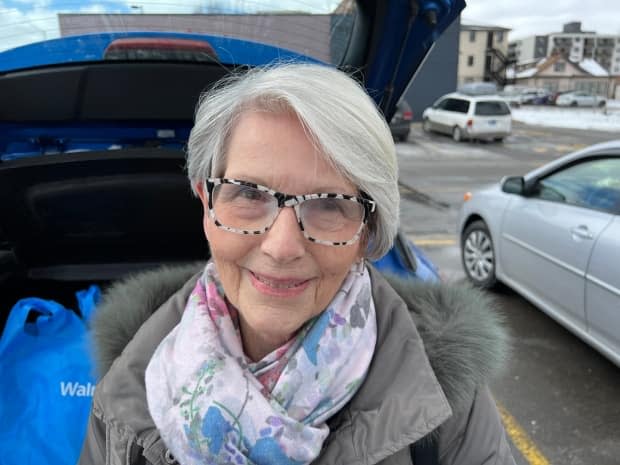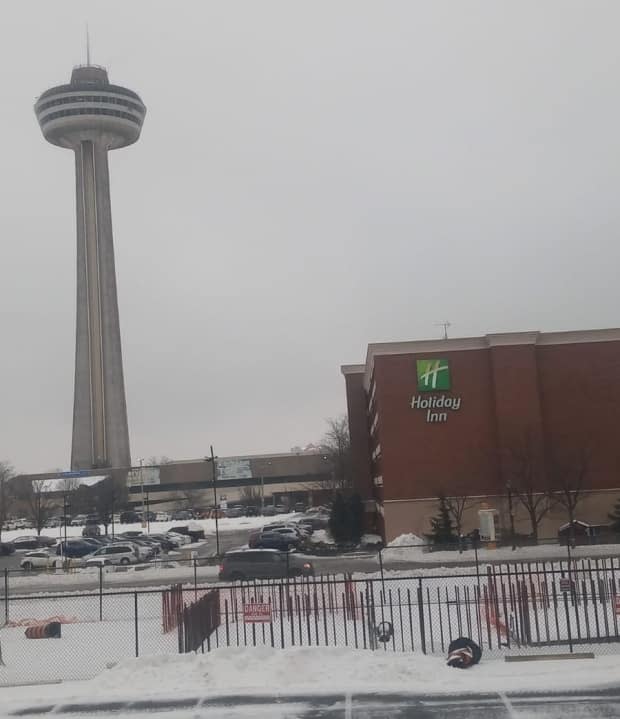Niagara Falls facing 'limits' in accommodating influx of asylum seekers, mayor says

It started last summer with 87, grew to 300, and most recently shot up to about 2,000 hotel rooms that were being utilized in Niagara Falls, Ont., to accommodate asylum seekers sent there from Quebec.
And with nearly 3,000 migrants in total having been transferred since July, the city's community services are feeling the pressure on their already stretched resources to meet the needs of this sudden influx of people.
"We're trying to be good Canadians and do what we always do, which is always lend a hand. But there's limits to everything that we can physically do," said Niagara Falls Mayor Jim Diodati.
"It's started to have an impact on our community in a lot of ways."
As tensions have simmered in Quebec over the tens of thousands of asylum seekers that have crossed into Canada on foot at the unofficial Roxham Road crossing, some 5,500 migrants have been bused to border towns in Ontario, including Niagara Falls, Windsor and Cornwall.
With strained resources and tourism season approaching, Niagara Falls is asking what happens next.

40,000 people 'count on tourism'
Immigration, Refugees and Citizenship Canada says it began transferring migrants arriving in Quebec to Ontario last July as Quebec's shelter system — and hotels rented by IRCC — reached capacity.
In a statement to CBC News, IRCC said that as of Feb. 13, 2,841 individuals have been transferred to Niagara Falls.
There's no official breakdown of where all the migrants are travelling from, but home countries include Haiti and Colombia, among others, with people speaking French, Spanish and Haitian Creole.
As of Feb. 19, 2023, 951 hotels rooms were occupied by asylum claimants in Niagara Falls, IRCC said, tapering off from the peak.
Still, it's unclear when that number could spike again and what impact that might have on the community and its services, especially since some of the hotels are in the heart of the tourist district.

Meanwhile, Diodati has expressed some concern to Immigration Minister Sean Fraser about the upcoming tourist season.
"We have 40,000 people in Niagara Falls that count on tourism to feed their families, pay the rent, pay their mortgages," he said.
Although the government is paying the hotels to house the asylum seekers, tourists who would normally be paying for those rooms also eat at the restaurants and go to the attractions.
"There's a much, much bigger multiplier. That's the difference. It's all the mom and pop operators, the T-shirt people, the people making fudge. Those are the people that aren't going to benefit because the asylum seekers don't spend money at these places," Diodati said.
"So I just tried to show [Fraser] some things that are obvious to us but maybe not so obvious to to the ministry."
City's homeless 'not staying in the hotels'
Although Niagara Falls may be the top tourist destination in the country, accommodating millions of visitors year-round, its population is relatively small at 95,000.
Residents offered mixed views of the role their city has been forced to play, with some complaining that the government should be focusing its resources on its residents.
"Where are our homeless?" Bob Boyle said. "They're sure as hell not staying in the hotels, are they."
Others, however, felt their city has a duty to help out the asylum seekers.

"They have to have a place to stay. I think, in the interim, it's what needs to be done," Eileen Halbert said. "These people are desperate. We're living here, we're able to shop, we have things. They really have nothing."
Diodati said he has heard from some residents who will often start off the conversation with "I'm not complaining, but" and go on to talk about not receiving as much as support as the asylum seekers.
He said it's not a surprise the government would choose Niagara Falls, with its large inventory of hotels, as a destination for the asylum claimants. The government pays for the rooms, but "due to third-party confidentiality" could not disclose lease details.
But Diodati said support agencies are feeling the pressure, with demand surging for services like food banks and other forms of social assistance.
Setting up classrooms in gymnasiums
Schools are also having to set up classrooms in their gymnasiums or libraries to deal with the extra students.
"A social safety net system ... isn't meant to pivot on a dime," said Deanna D'Elia, general manager at the YMCA of Niagara Employment & Immigrant Services.
Her organization provides language assessments, helps new arrivals register their children in school, provides career assessments and assists in accessing other community resources.
"I've been in the field of social services for about 30 years, and there's ebbs and flows," she said. "Individual demands will increase. Certainly in my time, I've not seen 2,000 [new arrivals] in a span of seven months.
"I think this current situation of an additional influx ... making their way into Niagara has just shone a light on a delivery system that was already reasonably fragile in terms of capacity."
Pam Sharp, executive director of Project Share, a Niagara Falls-based organization that provides emergency food and support services, said they are facing the challenge of trying to meet an increased need with the same level of support and resources.
"So of course that's going to stretch us."

Their numbers have grown exponentially, with a huge increase in December.
"That's not just Christmas programs specifically, but that's all of our programs and services. We saw 85 per cent more people accessing them," Sharp said.
"In my 11 years that I've been at Project Share, I've never seen numbers like that."
One of the biggest issues has been trying to find affordable housing for the asylum seekers, she said.
"Our city has declared a housing crisis. So there really is not a big inventory of affordable housing available right now. And the wait-list for Niagara regional housing is years long. So that's a big challenge right now."
Helped over 1,000 children
As for children, D'Elia said her organization has helped over 1,000 children and youth get into the local school system.
According to the District School Board of Niagara, about 300 elementary students have joined its schools, which has meant additional staff for the increased enrolment, as well as multi-language coaches to support with language, translations and the overall transition.
Sharp said their back-to-school program provided new backpacks, new school supplies, healthy kid snacks and new running shoes for children starting school.
"We did see our back-to-school program numbers almost double this year compared to last year," she said.

Diodati said the short-term solution to alleviate the pressures is certainly more funding from the government. But most importantly, he said, they need to know the overall plan of the government to deal with this influx of asylum seekers "so we can plan toward it."
And he questioned whether the government, with tourism season just months away, would be willing to pay the rental rates for hotel rooms that will go up "significantly higher."
"Do they want to pay it and are they going to pay them? And do we have the capacity for them? We may not, because I can tell you, during the summer, on the weekends, we're full. There's not a lot of choices.
"So that's why I'm saying ... 'So what's your plan?' I haven't heard what the plan is."


